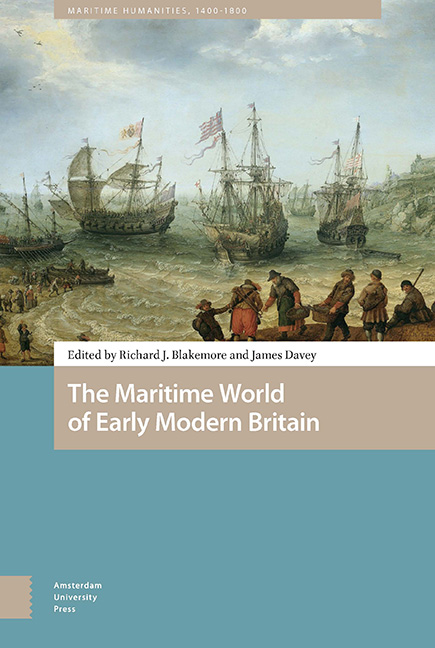Book contents
- Frontmatter
- Contents
- List of illustartions
- Acknowledgements
- Note on Conventions and Terminology
- Introduction
- 1 The Minion and Its Travels: Sailing to Guinea in the Sixteenth Century
- 2 Commanding the World Itself : Sir Walter Ralegh, La Popelinière, and the Huguenot Influence on Early English Sea Power
- 3 An Investigation of the Size and Geographical Distribution of the English, Welsh, and Channel Islands Merchant Fleet: A Case Study of 1571–72
- 4 An Evaluation of Scottish Trade with Iberia during the Anglo-Spanish War, 1585-1604
- 5 Performing ‘Water’ Ralegh : The Cultural Politics of Sea Captains in Late Elizabethan and Jacobean Drama
- 6 ‘Wicked Actions Merit Fearful Judgments’ : Capital Trials aboard the Early East India Company Voyages
- 7 A water bawdy house’: Women and the Navy in the British Civil Wars
- 8 ‘Thy sceptre to a trident change / And straight , unruly seas thou canst command’: Contemporary Representations of King Charles I and the Ship Money Fleets within the Cultural Imagination of Caroline England
- 9 ‘Proud Symbols of the Prospering Rural Seamen’ : Scottish Church Ship Models and the Shipmaster’s Societies of North East Scotland in the Late 17th Century
- 10 Systematizing the Sea : Knowledge, Power and Maritime Sovereignty in Late Seventeenth-Century Science
- Select Bibliography
- About the Contributors
- Index
7 - A water bawdy house’: Women and the Navy in the British Civil Wars
Published online by Cambridge University Press: 21 November 2020
- Frontmatter
- Contents
- List of illustartions
- Acknowledgements
- Note on Conventions and Terminology
- Introduction
- 1 The Minion and Its Travels: Sailing to Guinea in the Sixteenth Century
- 2 Commanding the World Itself : Sir Walter Ralegh, La Popelinière, and the Huguenot Influence on Early English Sea Power
- 3 An Investigation of the Size and Geographical Distribution of the English, Welsh, and Channel Islands Merchant Fleet: A Case Study of 1571–72
- 4 An Evaluation of Scottish Trade with Iberia during the Anglo-Spanish War, 1585-1604
- 5 Performing ‘Water’ Ralegh : The Cultural Politics of Sea Captains in Late Elizabethan and Jacobean Drama
- 6 ‘Wicked Actions Merit Fearful Judgments’ : Capital Trials aboard the Early East India Company Voyages
- 7 A water bawdy house’: Women and the Navy in the British Civil Wars
- 8 ‘Thy sceptre to a trident change / And straight , unruly seas thou canst command’: Contemporary Representations of King Charles I and the Ship Money Fleets within the Cultural Imagination of Caroline England
- 9 ‘Proud Symbols of the Prospering Rural Seamen’ : Scottish Church Ship Models and the Shipmaster’s Societies of North East Scotland in the Late 17th Century
- 10 Systematizing the Sea : Knowledge, Power and Maritime Sovereignty in Late Seventeenth-Century Science
- Select Bibliography
- About the Contributors
- Index
Summary
In the summer of 1645, as the royalists besieged the town of Pembroke, James Philips, a gentleman from the area, boarded the Lion, a parliamentarian man-of-war anchored at Milford Haven. He wished to speak with Captain Richard Swanley, the admiral of the fleet stationed there, but when he entered the great cabin he did not find Swanley inside. A smirking servant insisted to Philips that Swanley was indeed in the cabin. The by now bemused Philips re-entered, and this time a closet door opened to reveal Captain Swanley with his hat off and his arms around a young woman who was standing between his legs. The captain claimed that she was simply delousing him, at which point the woman, named Belindia Steele, blushed. Rumours of Swanley's dalliance with Belindia Steele spread among the parliamentarian maritime community, and sailors reportedly made up and sang songs about the relationship. The Lion developed an ill reputation for drinking, and for the conduct of the female passengers it carried: one witness suggested that the man-of-war had become a ‘water baudie house’. This story is much more complex, however, than simply being an amusing anecdote of the carryings-on of an older married officer (Swanley was aged around fifty) with a much younger woman. By examining questions of gender and the navy in the 1640s and 1650s, this chapter offers insights into the wider experiences of women with the Stuart navy and state. The large-scale availability of admiralty records from the period mean the Civil Wars and Interregnum offer historians a unique opportunity to undertake in-depth research into the complex interactions between women and the navy in one moment of Britain's maritime expansion.
In recent years, there has been extensive research into the ‘complex variety of women's experiences’ during the Civil Wars. Historians such as Barbara Donagan, Jacqueline Eales, Ann Hughes, Alison Plowden, Diane Purkiss, Mark Stoyle, and Amanda Jane Whiting among others have shed light on the opportunities and hardships women faced and overcame during the upheavals of the 1640s and 1650s. Despite this attention to the multifaceted experiences of women during the Civil Wars, there has been relatively little focus on women and the navy in this conflict.
- Type
- Chapter
- Information
- Maritime World of Early Modern Britain , pp. 173 - 192Publisher: Amsterdam University PressPrint publication year: 2020



